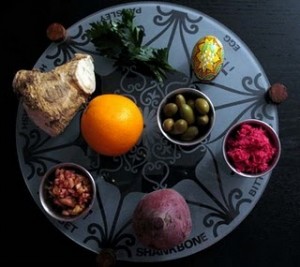
Today is the beginning of Passover, a Jewish holiday commemorating the Israelites’ freedom from slavery in Egypt. I’m not Jewish, but I’ll be having Passover Seder with feminist friends who have kindly included me and a bunch of other folks they have designated “Jews, almost-Jews, and People-I-Secretly-Think-of-as-Jews” (unclear if I’m in category B or C). I’m looking forward to it because hey, matzoh ball soup is the best and good friends are better, and the Seder organizer’s traditional Jewish prayer is the greatest (“They tried to kill us again. It didn’t work. Let’s eat.”).
There are some great feminist writings about Passover and the Haggadah; this one is a long-time favorite. What are you all doing this evening?